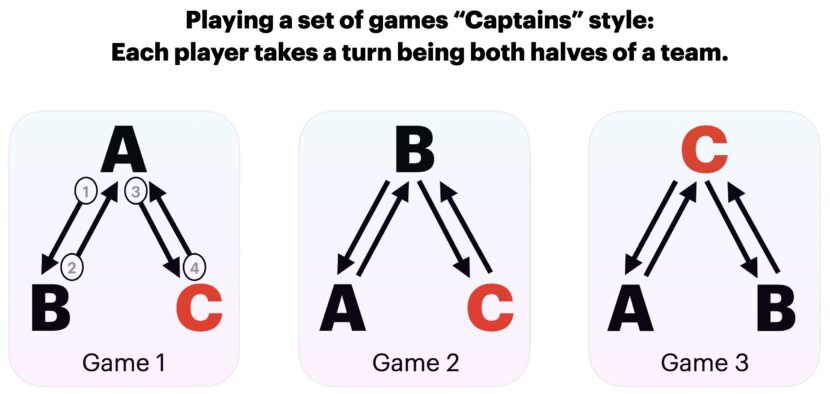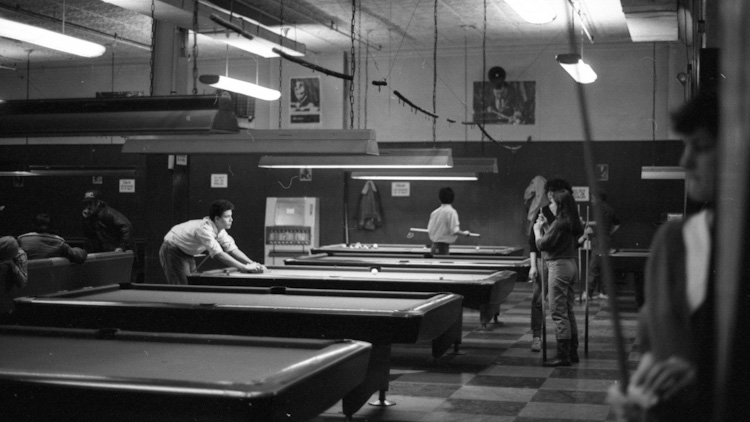There was a movie about pool made in 1986, called “The Color of Money”. On its soundtrack was an instrumental by Mark Knopfler called “Two Brothers and a Stranger” (youtu.be/oi7w2c8TOu8)
Go ahead and click that link, to have hustler music playing while you read this story.
My pool friends and I had all seen this movie, but there was no mention of “Two Brothers and a Stranger”.
We imagined it must be the name of a hustle, perhaps a subplot that got written out of the movie? We played pool for money all the time but we had never heard of anything called “Two Brothers and a Stranger”. We asked old-timers in the pool hall, but none of them had heard of it either.
Sometimes we tried to figure out what that hustle might mean. What could it be? It must be about three players. The “Two Brothers” are secret friends, and the “Stranger” is the target. The fish. The chump.
How could this work? Most games of pool are for two players.
How can we get it up to three? People won’t normally play money in “doubles” games. Pool is inherently solitary, each person’s private battle with confidence, probabilities, and the quest for excellence. A four-player game might be fun socially, but not for gambling.
Yet a variant of a four-player game was how we brought “Two Brothers and a Stranger” to life.
Why not a three-player game? We only knew of one, called Cut-Throat. But we couldn’t figure a way to have two players working together in secret for an unfair advantage.
That’s what a hustle is: It’s an unfair advantage, a tricky way to win someone’s money with greater leverage than they realize you have.
Back to the four-player games. And how do we get from four players down to three players? There’s a way of playing called “Captains”. Any two-player game can be turned into a three-player game by playing “Captains”.

Captains works like a Doubles game, except that players take turns being “both halves” of a team. It is customary for everyone to agree to a set of three games, so that each player is solo for one of the games.
If a game is played with a $10 wager, then the Captain either has a double-win or a double-loss.
So where is the hustle?
Suppose players A and B are secretly friends. Let’s call them the “Brothers.” Player C is the “Stranger” who is about to get hustled. Remember “C” for “Chump.”
Now imagine the first game of this three game set. In this game, Player A is captain, and Players B and C are the other team. Player C does not know that the entire purpose of this game is to guarantee that he loses. The order of play will be the “1, 2, 3, 4” in the diagram above. Here is where the evil trick comes in. Here’s what really happens on each of those four shots:
- Player A does his very best at sinking balls, without caution because his friend is next.
- Player B will miss no matter what, and deliberately leave Player A a very easy shot.
- Player A takes advantage of the excellent setup, and ends his turn leaving no shot for C.
- Player C misses because there was no good opportunity.
And around it goes, until the game ends. But each round of play is really the “Two Brothers” taking three consecutive turns, followed by the “Stranger” taking one turn.
Player C is the “Chump” in the first game, and loses. Player C is the “Chump” in the second game, and then loses again. Expecting to finally win 2x his money back in the third game, he gets to be the Captain and play an honest game. But that’s the one game where players A and B stop deliberately missing. It breaks down like this:
Game 1: Chump C loses $10, Brother B seems to lose $10 to A
Game 2: Chump C loses $10, Brother A gives back the $10 to B
Game 3: Chump C loses $20
Net result: Chump loses $40. Since Games 1 and 2 were nearly impossible for C to win, the best C can hope is to break even in Game 3. And if that happens, he’s likely to feel empowered and challenge the Brothers to another set of games. (A great time for the Brothers to raise the stakes.) Financially it’s a slaughter, even if the players are evenly matched.
The Brothers need to make a big fuss and carry on about how upset they are at handing money to each other.
This whole hustle only works if Player C believes that Players A and B do not know each other. A and B each take turns whispering in the ear of C, griping about the other, creating a big social illusion that the three players are participating equally. A or B might even pretend to argue over whether the other, cheated or if something was fair, putting C in the position of mediating a fake dispute.
Time after time, the Stranger mysteriously finds he never gets a good opportunity for winning. He has seen players A and B perform well at times (solo), and he has seen players A and B each lose money (though not as much as they make it seem like). All three players are complaining about how none of them can catch a break. But really C is the only one who loses every single time.
Having a deadbeat on your team is way more destructive than one might imagine.
It’s not like your team is just running at half-strength. The fact that the “Brothers” are colluding means they can deliberately create opportunities for each other. It’s truly “two against one” in this hustle. I try to be wary of this imbalance of power in other walks of life, too. You don’t want to be on the wrong side of it.
My friend and I found this to be so incredibly effective that we decided it was immoral to continue, and we stopped playing this way.







I spent a lot of time at Julians…